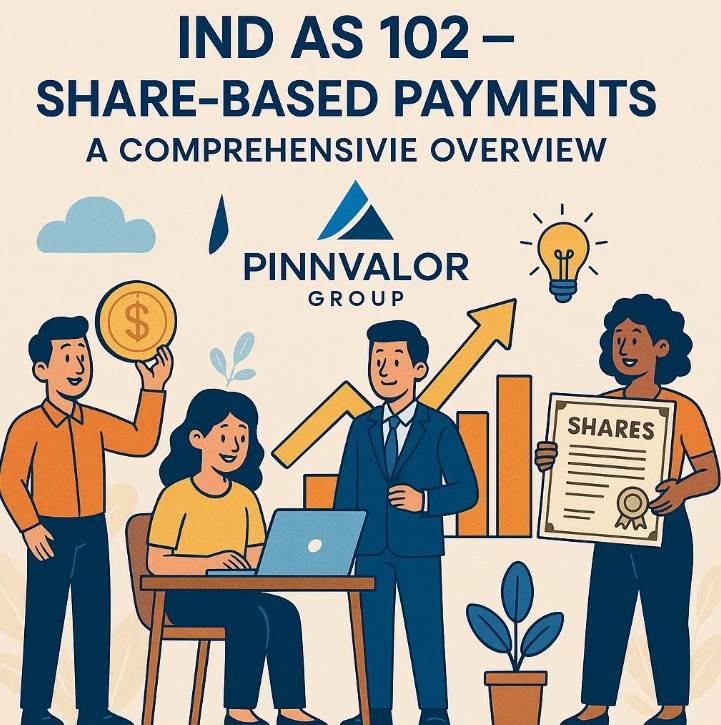
Ind AS 102 – Share-based Payments: A Comprehensive Overview
In the contemporary corporate landscape, share-based payment transactions have emerged as a pivotal mechanism for businesses to incentivize and reward employees, directors, consultants, and other service providers. These transactions often align the interests of employees and shareholders by linking compensation to the company’s equity performance. To ensure consistency, transparency, and accuracy in accounting for such transactions, Indian Accounting Standards prescribe Ind AS 102 – Share-based Payments.
In what ways does Ind AS 102 align Indian accounting with global IFRS standards?
Accurate accounting for share-based payments under Ind AS 102 empowers companies to reflect the true cost of employee compensation, aligning interests of stakeholders and enhancing financial clarity.
This blog delves deep into Ind AS 102, explaining its scope, recognition and measurement principles, types of transactions covered, and disclosure requirements.
What is Ind AS 102?
Ind AS 102 is the Indian Accounting Standard that provides guidance on accounting for transactions in which an entity receives goods or services in exchange for its own equity instruments (shares, stock options) or incurs liabilities that are based on the price of its own shares.
The standard aligns with IFRS 2 – Share-based Payment, ensuring that Indian companies follow globally consistent accounting practices.
Scope of Ind AS 102
Ind AS 102 applies to all share-based payment transactions, including:
- Equity-settled share-based payments: When goods or services are received in exchange for equity instruments of the entity (e.g., shares, stock options).
- Cash-settled share-based payments: When goods or services are received, but the entity incurs a liability to pay cash or other assets, based on the price (or value) of its shares.
- Transactions with a choice of settlement: Where either equity instruments are issued or cash paid, at the option of either the entity or the counterparty.
The scope includes share-based payments to employees, suppliers, consultants, and other parties.
Key Concepts and Definitions
- Grant Date: The date at which the entity and the counterparty agree to the share-based payment arrangement.
- Vesting Conditions: Conditions that must be satisfied for the counterparty to become entitled to the equity instruments or cash payment. These include service conditions (e.g., continuing employment) and performance conditions (e.g., achieving sales targets).
- Fair Value: The price that would be received to sell an asset or paid to transfer a liability in an orderly transaction between market participants at the measurement date.
Recognition Principles under Ind AS 102
For Equity-Settled Share-based Payments
- The entity recognizes the goods or services received, and the corresponding increase in equity, at the fair value of the equity instruments granted measured at the grant date.
- If the fair value of goods or services received cannot be reliably measured, the fair value of the equity instruments granted is used.
- The expense is recognized over the vesting period, which is the period during which the service conditions and performance conditions are met.
For Cash-Settled Share-based Payments
- The entity recognizes a liability for the goods or services acquired, measured at the fair value of the liability.
- This fair value is remeasured at each reporting date and at settlement, with changes recognized in profit or loss.
Measurement of Share-based Payments
- Equity Instruments: Fair value at grant date is usually estimated using option pricing models like the Black-Scholes model or a binomial model, considering factors such as exercise price, expected volatility, expected life of the option, risk-free interest rate, and expected dividends.
- Cash-settled Payments: Measured at the fair value of the liability, which changes over time based on the underlying share price or other variables.
Accounting for Modifications, Cancellations, and Settlements
- Modifications: Changes to the terms or conditions of the share-based payment arrangement (e.g., extension of vesting period, change in exercise price) require remeasurement and adjustment to expenses.
- Cancellations: When the entity cancels the share-based payment, it recognizes the cancellation impact immediately in profit or loss.
- Settlements: When the entity settles the obligation, it derecognizes the liability or equity instrument and recognizes any difference in profit or loss.

Disclosure Requirements
Ind AS 102 mandates detailed disclosures to provide transparency about share-based payments, including:
- Description of share-based payment arrangements.
- Number and weighted average exercise prices of share options granted, exercised, forfeited, and outstanding.
- Method and assumptions used to estimate fair values.
- Effect on profit or loss.
- Terms and conditions of share-based payment arrangements.
- For cash-settled payments, fair value of the liabilities.
These disclosures help users understand the nature and impact of share-based payments on the financial position and performance of the entity.
Why is Ind AS 102 Important?
Share-based payments often form a significant component of employee remuneration, especially in startups, technology companies, and other high-growth sectors. Proper accounting under Ind AS 102 ensures:
- Fair Presentation: The cost of employee services received in exchange for shares or share options is properly recognized.
- Transparency: Investors and stakeholders receive clear information on the impact of share-based payments on the financial statements.
- Alignment with Global Practices: By aligning with IFRS 2, Ind AS 102 promotes comparability of financial statements across jurisdictions.
Practical Example
Consider a company that grants stock options to its employees as part of their compensation. At the grant date, the company estimates the fair value of the options at ₹500,000. The options vest over 3 years.
- The company will recognize an expense of approximately ₹166,667 each year (₹500,000 / 3 years) in its profit and loss statement.
- Correspondingly, equity will increase by the same amount each year.
- If any modification or cancellation occurs, the accounting treatment will be adjusted accordingly.
Conclusion
Ind AS 102 – Share-based Payments is a comprehensive standard that ensures share-based transactions are accounted for consistently and transparently. As companies increasingly use equity instruments to compensate stakeholders, understanding and applying Ind AS 102 becomes essential for accountants, auditors, and financial analysts.
If you are interested, I can also help you create a summarized infographic or a LinkedIn post highlighting key takeaways from this standard.
